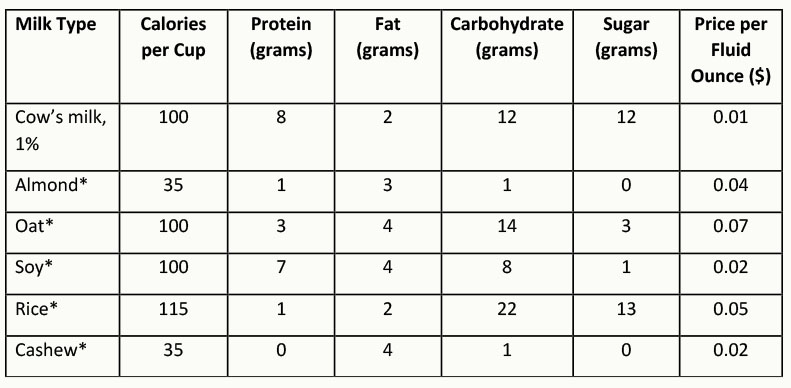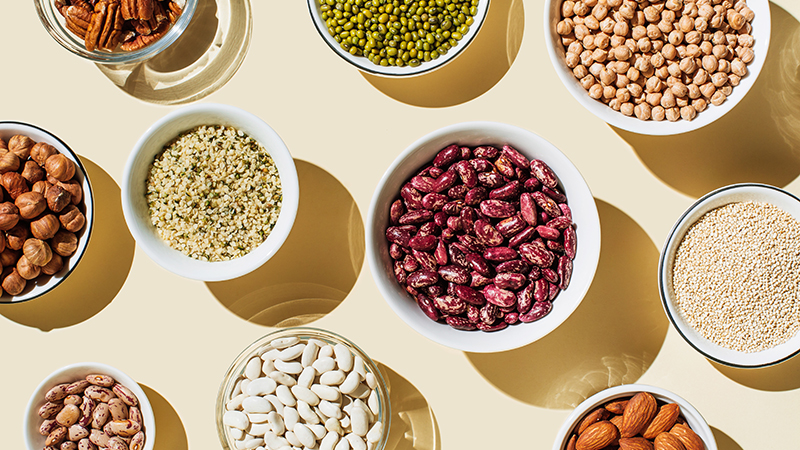Is Oat Milk Healthier Than Cow's Milk?
Published April 2021
An Expert Pours Over Different Milk Types
There's no question: Plant-based milks are becoming more popular. In 2019, plant-based milk sales increased by 5% over the previous year while dairy milk sales remained the same.
So, what’s the hype? And are plant-based milks healthier for adults?
Not necessarily, according to Julie Holbrook, MS, RDN, LDN, outpatient dietitian at Northwestern Medicine Huntley Hospital.
“Many people think plant-based milk alternatives like oat milk are a healthier option than cow’s milk,” says Holbrook. “This is not always the case ¬— there are pros and cons to both based on your nutritional needs and personal preferences.”
There are pros and cons to both plant-based milk and cow’s milk.— Julie Holbrook, MS, RDN, LDN
It’s also important to note for children that the American Academy of Pediatrics (AAP) recommends whole cow's milk until the age of 2 before considering plant-based milks.
Reasons to Choose Plant-Based Milks
Cow's milk is a good source of protein, calcium, vitamin D, vitamin A, vitamin B12 and other important nutrients that have health benefits. If you drink cow's milk, there may be no reason to switch to a plant-based option. However, here are some reasons people choose plant-based milks:
- They are good option for people who follow a vegan diet or those who are lactose intolerant.
- Some types are shelf stable (no refrigeration required before they are opened), which allows you to stock up and save fridge space.
- Some types are made with less impact on the environment.
- Plant-based milks are a good option if you have ethical concerns with farming.
- If you follow a vegetarian or vegan diet, most plant-based milks add vitamin B12. You may have low levels of vitamin B12 if you do not eat meat in your diet.
Nutrients by Type of Milk
There are many types, brands and flavors of plant-based milks. To find one that offers the nutrients you need to meet your health goals, it is important to read food labels.
“When selecting a plant-based milk, read the label to see if calcium, protein, vitamin A, vitamin D and potassium are listed,” says Holbrook. “In addition, choose an unsweetened version to limit calories and unnecessary added sugars."
When shopping for plant-based milk, consider:
- More than 5 grams of protein
- 0-2 grams of added sugars
- 20-30% recommended dietary allowances of calcium and vitamin D
- Whether or not the milk has been supplemented with calcium, vitamin B12, vitamin D and/or other vitamins
The 2015–2020 Dietary Guidelines Advisory Committee found that people are not consuming the vitamin D and calcium they need. This has been linked to adverse health outcomes. Cow’s milk is a great source of vitamin D, so if you’re opting for plant-based milk, make sure the milk you choose has enough vitamin D.
This table is a basic guide that shows the nutrients in cow's milk and some of the plant-based milks available today. Remember that calories, protein and other nutrients may vary widely by brand.

*Unsweetened
In order to decide which type of milk is right for you, consider the pros and cons of each.
Cow’s Milk
Pros
- Offers high-quality protein that contains all nine essential amino acids
- Calcium in cow's milk is highly bioavailable (able to be used by your body)
- Good source of vitamin A, vitamin D and other nutrients
- Least expensive vs other plant milks listed
- Widely available
- Lactose-free versions are available for people who cannot digest lactose (natural sugar in dairy foods)
Cons
- May not be tolerated by those who cannot digest lactose
- Whole milk is high in calories and fat
Almond Milk
Pros
- A good option to use in a smoothie made with protein such as protein powder or Greek yogurt
- A good option if you have an allergy to soy or you cannot digest lactose
- Has no sugar (unsweetened types)
- Low in carbohydrates, so it may be a good choice if you have diabetes
- Good source of polyunsaturated fats and vitamins A and E
Con
- Little or no protein
Oat Milk
Pros
- A good option if you have an allergy to soy or nuts or you cannot digest lactose
- It has a little more protein and fiber compared with other plant-based milks (almond, rice)
Cons
- More expensive than most other types of milk
- Some brands are made with small amounts of oils
Soy Milk
Pros
- Has a similar amount of protein to cow’s milk
- A good option if you have an allergy to nuts or you cannot digest lactose
- Low in sugar (unsweetened types)
Cons
- Flavored versions can be high in added sugars
- Not tolerated if you have a soy allergy
Rice Milk
Pro
- A good option if you have an allergy to gluten, soy and/or nuts
- It may be easier to digest for some people
Cons
- High in added sugars (sugar that is not naturally occurring)
- Little or no protein
- High in carbohydrates, so it may not be a good choice if you have diabetes
Cashew Milk
Pros
- No added sugar
- Its flavor and texture (close to whole milk) makes it a good option to use in soups, dressings and sauces
- May be a good choice if you need to limit amount of carbohydrates you eat
- Good source of polyunsaturated fats and vitamins A and E
Con
- Has little to no protein
“Cow's milk and plant-based milks can be enjoyed and included as part of a well-balanced diet that also includes plenty of fruits, vegetables, healthy fats and protein,” says Holbrook.





